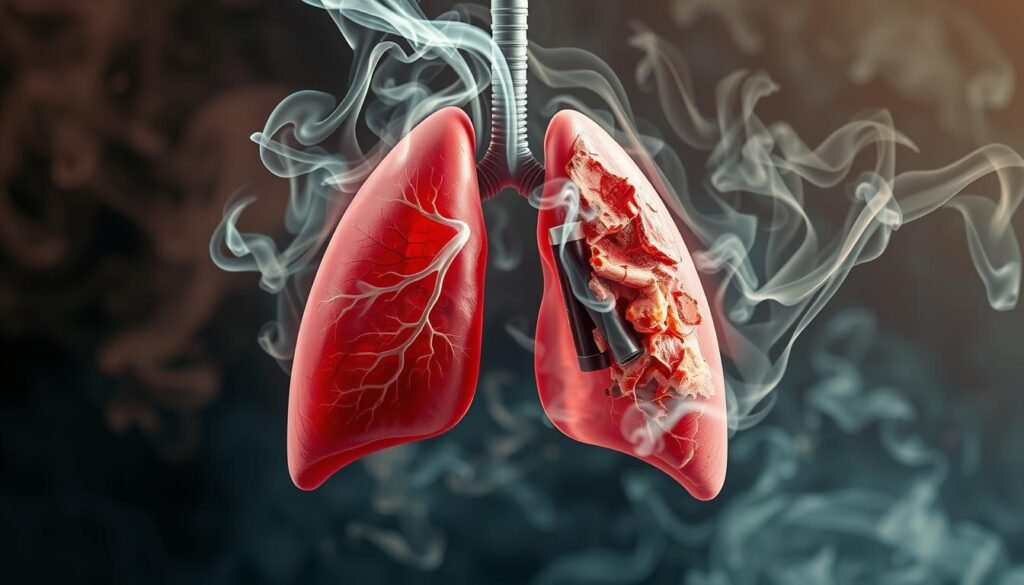Lung cancer is a major concern, causing 18% of all cancer-related deaths worldwide. The link between asthma and lung cancer is getting a lot of attention. It’s important because both conditions are becoming more common. Nearly 300 million people worldwide suffer from asthma. We need to know if asthma can increase the chance of getting lung cancer. This article looks into whether there’s a connection between asthma and lung cancer, a critical question for millions.
Key Takeaways
- The association between asthma and lung cancer varies, with some studies showing a 25% increased risk for asthma patients.
- Chronic inflammation linked to asthma may create a cancer-friendly microenvironment.
- Recent meta-analyses reflect mixed findings on the correlation between asthma and lung cancer.
- Partially controlled asthma has exhibited a significant increase in lung cancer risk.
- Adequate control of asthma symptoms may contribute to a reduced risk of lung cancer.
Understanding Lung Cancer and Its Prevalence
Lung cancer is a major health issue, leading to millions of diagnoses each year. Knowing the stats helps us understand how widespread it is. This knowledge is crucial for driving efforts in reducing risks. Also, knowing what increases the chance of getting lung cancer is key for early detection and prevention.
Statistics on Lung Cancer Cases
Lung cancer makes up 11.4% of all cancer cases worldwide. It causes about 18% of cancer deaths, showing it’s a serious concern. Small cell lung cancer (SCLC) and non-small cell lung cancer (NSCLC) are the main types. SCLC is 15-17% of cases, while NSCLC is around 85%.
Almost half of the patients find out they have lung cancer when it has already spread far. This leads to a very low 5-year survival rate of about 8%. But, those caught early have a much better survival rate of over 60%.
Common Risk Factors for Lung Cancer
Several factors can raise your risk of getting lung cancer. Smoking is the biggest one. Air pollution is also a serious concern, especially in cities where pollution is high. Diseases like asthma add to the risk too. It’s very important to understand these risks to better fight lung cancer’s impact.
What Is Asthma? A Brief Overview
Asthma is a chronic disease that makes breathing hard. It causes swelling in the airways. This can make life tough for those with the condition.
Definition and Symptoms of Asthma
Asthma involves problems in the bronchial tubes due to inflammation. The common symptoms include:
- Wheezing
- Shortness of breath
- Chest tightness
- Coughing, especially at night or during exercise
Symptoms can change in how bad they are and how often they happen. They’re usually caused by allergens, infections, or environmental factors like smoke.
Global Asthma Prevalence Rates
Over 300 million people around the world have asthma. About 10% of these are kids. This highlights why it’s important to know about asthma in the young.
| Year | Global Asthma Prevalence (estimated) | Children Affected (%)) |
|---|---|---|
| 2010 | 300 million | 10% |
| 2015 | 350 million | 9% |
| 2020 | 400 million | 10% |
This high number stresses the need for more awareness and research. It’s crucial to look into how asthma relates to other health issues, like lung cancer.
The Connections Between Asthma and Cancer
Recent studies show a link between asthma and increased cancer risk. This link is particularly strong in people with other health issues. Understanding how asthma-related inflammation can boost cancer risk is crucial.
Coexisting Conditions and Cancer Risks
People with asthma often have other health problems too. For instance, they are more likely to get cancer than those without asthma. They face higher risks for many cancer types, including lung, blood, skin, kidney, and ovarian cancers.
The combination of these health issues can make things much harder for asthma patients.
Chronic Inflammation’s Role in Cancer Development
Constant inflammation plays a big part in cancer risk for asthma patients. This inflammation helps cancer cells grow. Asthma patients not using inhaled steroids face a higher risk for many cancers.
But, those who use inhaled steroids mainly have a higher risk for lung cancer and melanoma. This fact suggests that asthma’s inflammation could be key in these risks. Getting to know more about this can help make asthma patients’ lives better.
Is Asthma a Risk Factor for Lung Cancer?
Studies show a strong link between asthma and the higher chance of getting lung cancer. Such research points out that people with asthma are more likely to get cancer, especially lung cancer. Understanding this relationship helps us see how asthma affects lung cancer risk, considering the stats, gender, and race.
Recent Studies and Meta-Analyses
Asthma sufferers have a 36% increased chance of developing cancer versus those without asthma. An analysis of health records from 2012 to 2020 discovered a constant link between having asthma and a higher risk for different cancers. Lung cancer stands out, with a specific study showing those with asthma having a 1.58 times standard chance of getting it.
| Cancer Type | Association in Asthma Patients |
|---|---|
| Lung Cancer | Higher Risk |
| Blood Cancer | Elevated Risk |
| Melanoma | Increased Risk |
| Kidney Cancer | Greater Risk |
| Ovarian Cancer | Significant Risk |
Gender and Racial Disparities in Risk Assessment
The risk of lung cancer in asthma patients is affected by gender. Women with asthma show a higher standardized incidence ratio (SIR) of 1.78, while men have a SIR of 1.51. Besides, there are notable racial differences, with Caucasians and Asians having higher chances of lung cancer when they have asthma. These findings show why we need focused research and specific preventive measures for different groups.
The Mechanisms Behind the Association
Exploring how asthma links to lung cancer gives us important clues about chronic inflammation. This kind of inflammation is key in asthma and helps drive changes in cells that lead to cancer. It involves making harmful molecules and signaling proteins, raising the chance of DNA damage and tumor growth.
How Chronic Inflammation Contributes to Carcinogenesis
Chronic inflammation sets the stage for cancer to develop. Research shows people with asthma history might face up to a 25% higher lung cancer risk. This is compared to those without asthma. The ongoing inflammation in asthma sufferers can cause gene changes leading to cancer. This highlights why chronic diseases and health in the long run are linked.
Impact of Air Pollution Exposure
The dangers tied to chronic inflammation in asthma patients grow with air pollution exposure. Pollutants worsen inflammation, boosting asthma’s effects and the cancer risk. The mix of environmental factors and lasting inflammation needs focus. It shows the complex risks of lung cancer in people with existing breathing issues.
Smoking, Asthma, and Lung Cancer Risk
Smoking and asthma together greatly increase lung cancer risks. About 18 percent of U.S. adults with asthma smoke. This is higher than the 13.6 percent of people without asthma who smoke. Understanding how smoking and asthma interact is key for lung health.
Cigarette smoking is the leading cause of preventable deaths. It is linked to 80 percent of lung cancer deaths. The risk of lung cancer for smokers is much higher than for non-smokers.
The Interplay Between Smoking and Asthma
People with asthma have a hard time when they smoke. Smoking worsens their respiratory issues. It can cause more inflammation and lung problems.
Smoking may also trigger asthma attacks, making the airways more vulnerable. This increases the cancer risk. Stopping smoking is crucial, especially for those with asthma.
Evidence Supporting Increased Risk in Smokers with Asthma
Studies show that smokers with asthma are at higher risk for lung cancer. It’s clear we need special stop-smoking programs for people with asthma. Programs like Freedom From Smoking have helped many quit smoking.
Healthcare providers must focus on these programs. They can help lower lung cancer rates in people with asthma. For more info, check out this study.

Specific Types of Lung Cancer Linked to Asthma
Studies link asthma to certain lung cancer types in important ways. While many lung cancer types exist, their link to asthma changes with each type. Knowing these differences helps create better prevention and care for asthma patients.
Lung Squamous Cell Carcinoma and Asthma Associations
New research shows a strong link between asthma and lung squamous cell carcinoma. The risk for this cancer is higher in people with asthma. For men, the risk increases to 1.52, and for women, it’s 1.50.
This means we must watch asthma patients closely for any symptoms of squamous cell carcinoma.
Absence of Association with Lung Adenocarcinoma
However, asthma doesn’t link to lung adenocarcinoma in the same way. Studies show the risk for people with asthma is low, at 1.13 for men and 1.18 for women. This tells us we need different prevention plans, focusing more on squamous cell carcinoma risks.
New Research Findings: Insights and Implications
New studies shed light on how asthma might increase the risk of lung cancer. They point to causal links needing more study. In a huge study involving 90,021 adults with asthma, those with asthma were found to have a 1.36 times greater risk of getting cancer. This highlights how managing asthma well is crucial.

Key Findings from Recent Research Studies
Research showed asthma patients have a higher cancer risk. The risk was 1.36 times more, especially for lung cancer (HR, 1.25). Not using inhaled steroids was linked to even higher risks of cancer like lung (HR, 1.74) and melanoma (HR, 2.05). This hints that inhaled steroids might help lower some cancer risks.
Potential Causal Links Suggested by Mendelian Randomization Studies
Mendelian randomization studies back up these results. They look at genetic links between asthma and cancer. The findings suggest knowing causal links could improve public health efforts. Not managing asthma can raise cancer risk, with genes also playing a role. More research is needed to understand these factors and find ways to prevent cancer.
The connection between treating asthma and cancer risk is vital. It might lead to better health policies and help patients greatly.
Explore more about the connectionbetween asthma and lung cancer
Prevention and Management Strategies
Managing asthma well is key to lowering the chance of getting lung cancer. It’s especially important to stop smoking. Evidence links smoking strongly to lung cancer. Giving up tobacco is a big step towards health for those with asthma.
Smoking Cessation Programs for Asthma Patients
There are special programs to help asthma patients quit smoking. These include:
- Personalized counseling sessions
- Support groups to encourage lifestyle changes
- Quitline resources for immediate assistance
- Medicinal aids to handle withdrawal symptoms
Studies show these programs are good for your health. They lower lung cancer risk. They can greatly improve life quality and breathing health.
Strategies for Reducing Lung Cancer Risk
To cut lung cancer risk, asthmatics should take several steps. Getting regular lung cancer checks is vital for high-risk people. Early detection and treatment can help a lot.
Asthma control is important too, using meds like inhaled corticosteroids. They might protect against lung cancer. Staying active, eating well, and avoiding pollution are also key.
Knowing the latest research is beneficial. For instance, certain asthma types might raise lung cancer risk. You can learn more about asthma and lung cancer research here or the link between allergies and lung cancer here.
| Strategy | Description |
|---|---|
| Smoking Cessation | Programs designed to help asthmatics quit smoking to lower lung cancer risk. |
| Regular Screenings | Early detection of lung cancer through routine check-ups in high-risk individuals. |
| Inhaled Corticosteroids | Medication that may reduce inflammation and potentially provide chemopreventive effects. |
| Lifestyle Changes | Encouraging physical activity and balanced diets to enhance overall health. |
Future Research Directions
Future research must shed light on how asthma impacts lung cancer. We need detailed studies to understand the connection between them. These studies will help identify how certain risk factors and mechanisms are involved. This is crucial for finding ways to prevent and treat these conditions.
Areas Needing Further Exploration
Areas for exploration that need focus include:
- The effect of different asthma treatments on lung cancer risk.
- Looking into genetic factors that might increase the risk for those with asthma.
- Studying how things like air pollution and secondhand smoke affect asthma and lung cancer.
- Exploring how asthma and cancer risk differ among genders and ethnicities.
Importance of Longitudinal Studies in Understanding Causality
Longitudinal studies play a key role in proving the link between asthma and lung cancer. They track patients over years to see how asthma relates to lung cancer. This approach uncovers:
- The timing between asthma flare-ups and a lung cancer diagnosis.
- The impact of long-term asthma treatment on lung cancer rates.
- Possible direct connections as patients undergo different life experiences and exposures.
Through these studies, we can better understand asthma’s influence on lung cancer. This will improve our prevention methods and treatments.

Conclusion
The link between asthma and lung cancer is important to look at. It shows that people with asthma might be more likely to get lung cancer. This is especially true for smokers and some groups of people.
A study from Sweden found that asthma patients had a 1.58 times higher chance of getting lung cancer. This highlights how crucial it is for health experts to focus on preventing and managing asthma effectively. They should also use strategies from this useful resource.
Chronic inflammation from asthma may also increase the risk of lung cancer. Certain types of lung cancer, like squamous cell and small cell carcinomas, could be more common in people with asthma. This is different from adenocarcinoma.
It’s important to keep an eye on those who have asthma. This is true, especially as they get older or if they have other health problems.
It’s vital we keep learning about how asthma and lung cancer are connected. Raising awareness and catching things early can lead to better health for everyone. Knowing how these conditions are linked can result in better care and more focused treatments.
We need to use these insights to improve healthcare policies and actions. Doing so will make a big difference in public health.